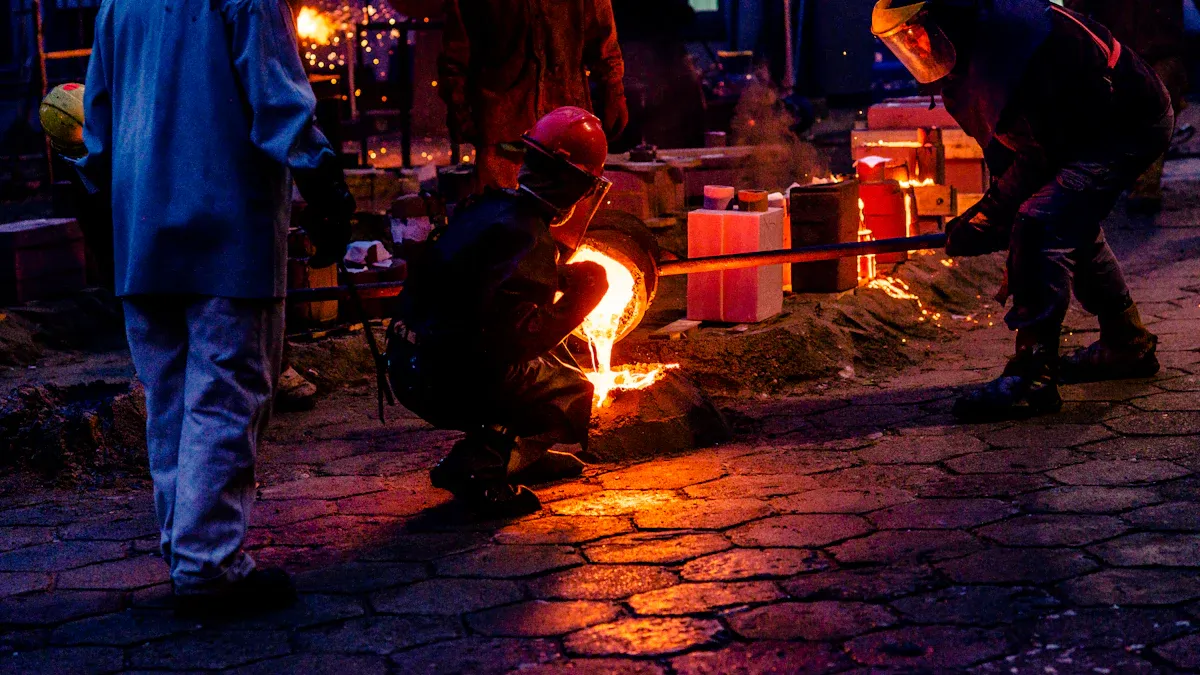
When choosing duplex stainless steel castings, picking the right one helps. It can save you time, money, and stress. These castings are strong and resist rust very well. For example, SS316L and Inconel 625 rust less than others. This makes them good for tough environments. The way they are made also affects how long they last.
Pick duplex stainless steel grades that fit your needs. If you need castings for chemical plants or boats, choose the right type. This will make sure they work well and last long. Working with a trusted supplier like JC Casting Foundry ensures you get high-quality castings made just for you.
Key Takeaways
- Pick the correct duplex stainless steel type for your project. This helps it last longer and work well in tough places.
- Find a reliable supplier with experience and proper certifications. This ensures you get good-quality castings made for your needs.
- Look at the material mix in duplex stainless steel. A good mix of ferrite and austenite makes it strong and rust-proof.
- Think about the total cost over time. Spending more on better castings now can save money on fixes later.
Overview of Duplex Stainless Steel Castings
Duplex stainless steel castings are very useful in tough industries. They are strong and resist rust, making them stand out. Industries like oil, gas, and construction often use them. Let’s explore why they are so special.
Properties of Duplex Stainless Steel
Duplex stainless steel has two types of metal structures. These are ferrite and austenite. This mix makes it strong and resistant to rust. Studies show its structure helps stop cracking and rusting.
For example, heating can improve its rust resistance. But bad welding can make it weaker. The material’s condition also affects the final product’s quality.
These features make duplex stainless steel great for tough places. It works well in offshore drilling and chemical plants.
Understanding Duplex Stainless Steel Grades
Picking the right grade is very important. Grades are grouped by their pitting resistance number (PREN). Here’s a simple table:
| Grade Type | PREN Range | Typical Grade | Key Properties |
|---|---|---|---|
| Standard Duplex | 28–38 | EN 1.4462 | Good for many uses, with balanced properties. |
| Super Duplex | 38–45 | EN 1.4410 | Very strong and rust-resistant, ideal for oil and gas. |
| Lean Duplex | 22–27 | EN 1.4362 | Made for lighter tasks, still strong and rust-resistant. |
For example, super duplex is great for oil and gas jobs. It is strong and resists rust very well.
Applications of Duplex Stainless Steel Castings
Duplex stainless steel castings can be used in many ways. Here are some examples:
- Oil and Gas Industry: Perfect for pipelines and drilling because they resist rust.
- Chemical and Petrochemical Industries: Used in tanks and reactors that face harsh chemicals.
- Construction and Infrastructure: Great for bridges and buildings due to strength and looks.
Studies show these castings resist rust better than other types. Heat treatment improves them, but welding might lower their rust resistance.

These castings stay strong in extreme temperatures, from -80°C to +20°C. They work well in salty or high-pressure environments. Duplex stainless steel castings are a dependable choice.
Key Factors for Choosing Duplex Stainless Steel Castings
When picking duplex stainless steel castings, focus on key points. These help you find the best material for your project. Whether it’s for machines, boats, or buildings, these tips will guide you.
Material Mix and Strength
The mix of metals in duplex stainless steel affects its strength. It combines ferrite and austenite, giving it special qualities. But not all mixes are the same, so choose wisely.
- Why It’s Important:
Duplex stainless steel is strong and resists damage. But, it can fail if used in high heat (300–900 °C) without the right material. - What Research Says:
Studies show ferrite levels change strength. For example:Ferrite LevelHardness (HV)Stiffness (GPa)Drops from 0.64 to 0.28Rises to 237 HVRises to 64 GPaDrops to 0.20Rises to 301 HVRises to 146 GPaLower ferrite means better hardness and stiffness. If you need strong castings, pick ones with less ferrite. - Comparing Metal Mixes:
Different alloys perform differently. For example:- Alloys with 25% SS316L are strongest.
- Alloys with 50% SS316L stretch more but are less strong.
Rust Resistance and Toughness
Duplex stainless steel resists rust well, but not all types are equal. Knowing how they handle tough conditions can save money and time.
- How It Handles Harsh Places:
A study tested super duplex steel in salty water. In 30g/l NaCl, surface damage lowered strength. But in 60g/l NaCl, it lasted longer than in air. The salt polished the surface, reducing damage.What does this mean? For salty or harsh places, pick the right grade to make castings last longer. - Where It’s Used:
- Offshore drilling rigs
- Chemical storage tanks
- Ships and boats
Balancing Cost and Quality
Finding the right balance between price and performance is key. Duplex stainless steel may cost more upfront but saves money over time.
- Why It’s Worth It:
These castings last longer and need less fixing. Their strength-to-weight ratio means you use less material, saving money. - Price vs. Performance:
Lean duplex is cheaper but less rust-resistant than super duplex. For light tasks, lean duplex works well. For tough jobs, super duplex is worth the cost.
Tip: Think about the total cost over time, not just the price now. Spending a bit more today can save big repair costs later.
By focusing on material mix, rust resistance, and cost, you can pick the best duplex stainless steel castings for your job.
How to Pick Duplex Stainless Steel Casting Suppliers
Choosing the right supplier is very important for your project. A good supplier gives you strong, high-quality castings that fit your needs. But how can you find the best one? Let’s make it simple.
Supplier Experience and Knowledge
A supplier with lots of experience knows the material well. They understand duplex stainless steel’s mix of ferrite and austenite. This helps them make castings that work in tough places.
Here’s what to check:
- Industry Knowledge: Does the supplier know your field? For example, oil and gas projects need castings for pipelines or rigs.
- Past Work: Have they done similar jobs before?
- Support: A good supplier helps you pick materials and improve designs.
Tip: Ask for examples of their past work. A trusted supplier will share their success stories.
Certifications and Standards
Certifications show that a supplier follows strict rules for quality and safety. Look for certifications like ISO 9001 or ISO 17025. These prove they use good practices for quality checks and risk control.
| Standard | What It Ensures |
|---|---|
| ISO 9001 | Quality checks, risk control, and supplier performance |
| ISO 17025 | Testing accuracy, audits, and equipment checks |
Also, check for certifications for specific industries. For example:
- ISA/IEC 62443: Focuses on keeping industrial systems safe from cyber threats.
- ISASecure Certification: Proves the supplier follows cybersecurity standards.
Did You Know? ISASecure offers certifications like CSA and SSA. These show a supplier can make safe and reliable products.
Picking a certified supplier lowers risks and ensures they follow industry rules.
Production and Customization
Every project is different, so your supplier should be flexible. Whether you need a small or big order, they should meet your needs without losing quality.
Here’s what to ask:
- Order Size: Can they handle the amount you need?
- Custom Options: Can they change the alloy mix for your project?
- Tools and Tech: Do they use advanced methods like heat treatment for better results?
A strong supplier can also adjust if your project changes. Need faster delivery? They should be able to manage it.
Pro Tip: If you can, visit their factory. Seeing their work in person helps you understand their abilities.
By focusing on experience, certifications, and production skills, you can find the right supplier. Remember, a good supplier isn’t just a seller—they’re a partner in your success.
Ensuring Quality Assurance

Making sure your duplex stainless steel castings are top quality is key. It’s not just about testing; every step must be checked. Let’s see how to ensure your castings are the best.
Testing Methods for Duplex Stainless Steel Castings
Testing finds problems early and ensures castings work well. Here are some common ways to test:
- Non-destructive testing (NDT): Uses tools like ultrasound to find hidden flaws.
- Mechanical testing: Measures strength and hardness to check durability.
- Corrosion testing: Tests if the material can handle rust and tough conditions.
You should also track quality measures like:
- How many defects are found
- How much testing is done
- Customer feedback scores
By focusing on these, you can make sure your castings are strong and reliable.
Compliance with International Standards
Standards are important for safety and quality. Check if your castings meet rules like ASTM, ISO, or EN.
For example, ASTM A890 lists what metals and strengths are needed. ISO 9001 shows the supplier uses good quality checks.
Why is this important? Standards make sure your castings are consistent. They also help them work well in tough jobs like chemical plants or oil rigs.
Inspection and Documentation Processes
Checking and keeping records is important for quality. These records show every step of production. Look for:
- Maintenance logs with dates and who did the work.
- Inspection reports with dates and inspector names.
- Calibration records showing equipment checks and dates.
- Test results signed by the person who did the test.
- Steps for fixing problems, including what was done.
These steps keep things clear and organized. If something goes wrong, you can find and fix it fast.
By testing, following standards, and keeping good records, you ensure quality. This saves time, money, and gives confidence that your castings will work well.
Duplex stainless steel castings are great for tough tasks. They are strong and resist rust, making them ideal for oil, gas, and building industries.
To choose the best casting, focus on these three things:
- Material properties: Make sure the mix fits your job.
- Supplier qualifications: Pick skilled suppliers with proper certifications.
- Quality assurance: Check for good testing and meeting standards.
Pro Tip: JC Casting Foundry offers custom solutions you can trust. Their skill ensures you get strong castings that work well in hard conditions.
FAQ
1. How is duplex stainless steel different from regular stainless steel?
Duplex stainless steel has two metal types: ferrite and austenite. This makes it stronger and better at resisting rust. Regular stainless steel has just one type, so it’s less tough in harsh places.
Tip: Use duplex stainless steel for tough jobs like offshore rigs.
2. How do I pick the right duplex stainless steel grade?
Choose a grade based on what your project needs. For example:
- Super Duplex: Great for resisting rust in extreme conditions.
- Lean Duplex: Works well for lighter, less demanding tasks.
Pro Tip: Look at the PREN value to match your environment.
3. Can duplex stainless steel castings handle high heat?
Yes, but only within a certain range. It works well between -80°C and +300°C. Outside this range, it may lose its strength.
Note: Always ask your supplier about heat limits for your project.
4. Are duplex stainless steel castings worth the cost?
Yes! They cost more at first but last longer. They also need less fixing and use less material because they’re strong.
5. How do I make sure my supplier gives good castings?
Check for certifications like ISO 9001 or ASTM standards. Ask about their testing, past work, and if they offer custom options. A good supplier will also share inspection reports.
Reminder: JC Casting Foundry provides certified, high-quality castings made for your needs.
